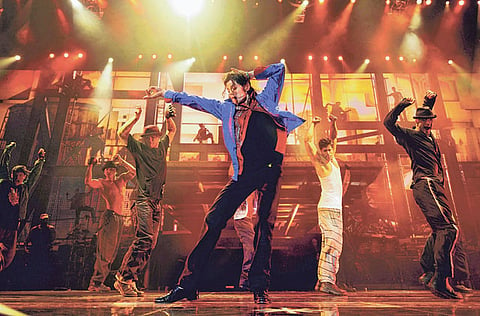Blood on the dance floor
Doctor Murray claimed he was betrayed and entrapped by Jackson

London/New York: All his life, Michael Jackson sought out the company and counsel of questionable advisers who eventually betrayed his interests. His encounter with Dr Conrad Murray, a previously well-regarded cardiologist from Houston, Texas, who he hired as his personal physician, would prove fatal.
The relationship between Jackson and Murray was a microcosm of the deep dysfunction in Jackson's life over his final years. On one side was a pop legend struggling to overcome addictions to painkillers and plastic surgery so he could go out on the road one more time and show the world a little of his former glory; on the other was a man desperate and indebted enough to be tempted by a monthly pay cheque of $150,000 (Dh550,980) and indulge Jackson's craving for ever more powerful sedatives.
Murray says he was betrayed by Michael Jackson who "entrapped" him into living in his home and providing continuous medical and emotional support. In a documentary filmed during the trial of Jackson's physician, Murray said he expected to be a general family doctor but found himself enmeshed in the icon's scarred and claustrophobic life.
"Once I got in there I was entrapped," he said. "Through his most intense desire to have me there with him, it was interwinded [sic] with a degree of betrayal."
Desperate pleas
Murray recalled Jackson's desperate pleas for sleeping medication on the day of his death, saying the singer resembled the zombie character from the Thriller music video.
"He was basically hysterical," he said. "He begged and pleaded and said, ‘please Dr. Conrad, I need some milk so that I can get some sleep. If I don't get some sleep everything will go down the drain. He looked to me during that morning to be like the thriller. He looked that hysterical."
Breaking down in tears as he described the moment of the singer's death, he said: "I tried so hard. It was horrible I didn't want to lose him. I love him."
The documentary prompted the executors of the singer's estate to urged broadcasters not to show it.
In a letter to MSNBC's management, the Jackson representatives argued that Murray, convicted of involuntary manslaughter in Jackson's death, uses the documentary "to shift the blame post-conviction to Michael Jackson, even though a jury considered the evidence and rejected this very argument".
MSNBC bought Michael Jackson and the Doctor: A Fatal Friendship from a British production company and aired it along with an "exclusive" interview with Murray by NBC News correspondent Savannah Guthrie.
MSNBC representatives said earlier the channel did not pay for access to Murray or contribute to his legal defence. The producer of the documentary, October Films, said it paid only $1 for two years of access to Murray and a behind-the-scenes look at his legal defence.
Murray's unethical behaviour came as a surprise to many patients in Las Vegas and Houston who appreciated his willingness to work with patients who were either uninsured or could not afford his standard rates. What they did not know, however, was that he was deeply in debt, owing more than $250,000 in settlements against his business, outstanding mortgage payments, student loans and unpaid child support.
His history of financial problems was long and troubled; he filed for bankruptcy in 1992 and had claims lodged against him for back taxes several times in California and Arizona. He had met Jackson in Las Vegas when he was called to treat one of the singer's children.
Murray lived with him at the Holmby Hills mansion and was planning to travel with Jackson on the tour. Instead, he was slapped with criminal charges and now faces up to four years in prison along with the loss of his medical licence.
Star asks for fatal ‘milk'
Dr Conrad Murray had refused to explain at his trial how Jackson died, but described the singer's last moments in a paid-for interview for a TV documentary.
"He was pleading and begging to please, please let him have some ‘milk' because that was the only thing that would work," said the 58-year-old cardiologist. He was referring to propofol, the powerful hospital anaesthetic Jackson, 50, overdosed on the day he died.
But in the TV documentary, which began filming soon after Jackson died, Murray described a scene of chaos in which he administered CPR to the singer while urging security staff to help him and call the services.
An excerpt from the documentary, Michael Jackson and the Doctor: A Fatal Friendship, was shown on breakfast TV in the US was broadcast on Channel 4.
Murray will return to court on November 29 for sentencing.
— Daily Mail (With inputs from The Daily Telegraph and Los Angeles Times)
Sign up for the Daily Briefing
Get the latest news and updates straight to your inbox



